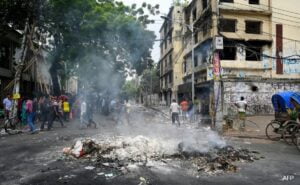ButSpeak.com
News which Matters.

Following ex-Prime Minister Sheikh Hasina’s departure, Bangladesh faces violence and attacks on Awami League leaders and minorities, with Nobel laureate Muhammad Yunus leading an interim government.
Bangladesh has been engulfed in violence following the departure of former Prime Minister Sheikh Hasina, with reports indicating the discovery of twenty bodies belonging to Awami League leaders across the nation. The turmoil erupted after student protests against job quotas for the children of freedom fighters turned violent.
The violence has not only targeted political leaders but also minority communities, particularly Hindus, who have faced widespread vandalism and looting of their homes and businesses. Reports from Dhaka indicate a severe escalation in attacks, with rights groups and diplomats voicing deep concerns about the safety of minorities.
Rana Dasgupta, General Secretary of the Bangladesh Hindu Buddhist Christian Unity Council, highlighted the severity of the situation in a statement. “Houses and shops of minority people were attacked, vandalized, and looted at at least 97 places on Monday and Tuesday,” Dasgupta said. The group also reported that at least ten Hindu temples were attacked by “miscreants” on Monday alone.
The presidency has announced that Nobel Prize-winning microfinance pioneer Muhammad Yunus will lead an interim government, a decision reached in a high-level meeting with President Mohammed Shahabuddin, military leaders, and student representatives. “They decided to form an interim government with Professor Dr Muhammad Yunus as its chief,” the statement from President Shahabuddin’s office read.
This development marks a significant shift in Bangladesh’s political landscape as the nation grapples with violence and unrest. The interim government’s primary challenge will be to restore order and address the underlying tensions that have led to this unprecedented wave of violence and attacks on minority communities.